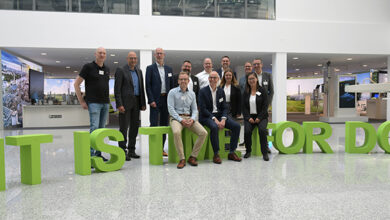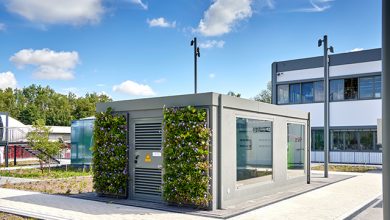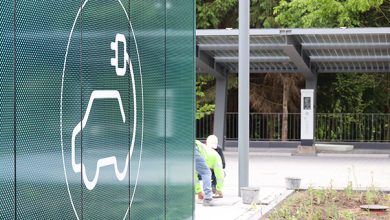Two degrees are hardly noticeable to the average person. But while the human sensory organs care little about this temperature increase, Mother Earth and her gas shell are getting mighty hot. This is a development that the 2° Foundation wants to prevent as far as possible. Phoenix Contact recently joined the foundation. A visit to the foundation will explain why.
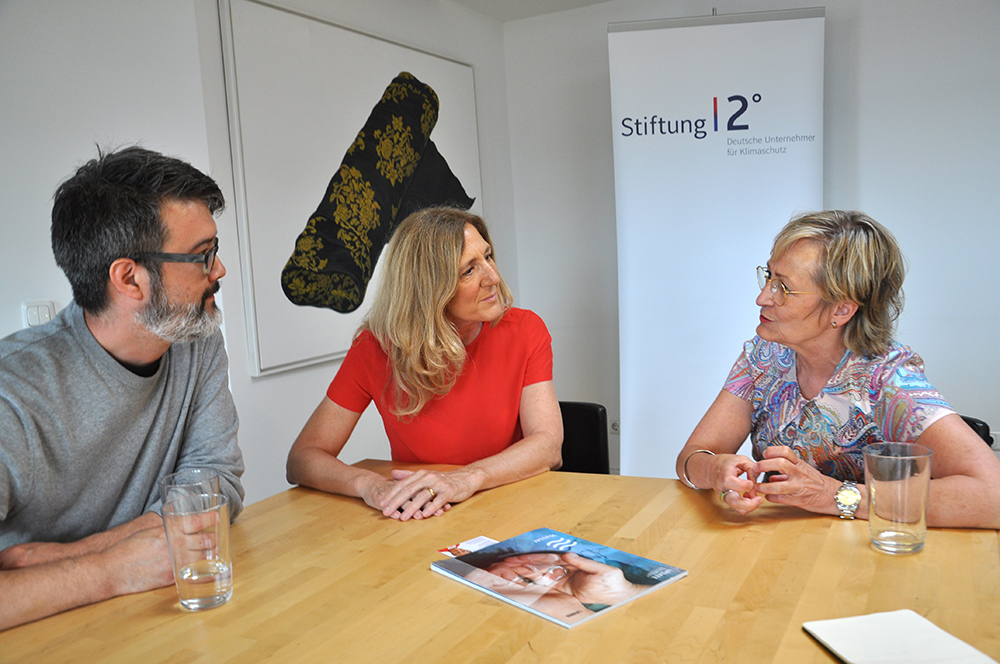
Site visit to Berlin. In keeping with the theme, shirts and pants are sticking to the sultry air in the capital. The weather forecast predicts atmospheric trouble in the southern parts of the country. But in the office of the 2° Foundation, it’s bearable. This is not due to the lack of air conditioning, but much more to the refreshing spirit that the active people here exude.
We have an appointment with Sabine Nallinger and Mikiya Heise. The two are the foundation’s managing director and press spokesman, and they not only want to explain the objectives of the Berlin-based enterprise. They also want to tell us what they expect from Phoenix Contact, the sponsoring company.

UPDATE: The goals of the Foundation 2° are honorable and on everyone’s lips. But what kind of foundation or organization are you?
Nallinger: We are a lobbying organization. A lobbying organization for climate protection. Our goal is to keep global warming well below two degrees. As the latest IPCC report again impressively demonstrates, we don’t have much time left to do that. And we are an organization that is getting very specific.
In the foundation’s founding phase, we still sometimes had to explain that climate change exists at all; that was not self-evident. The discussion in recent years about climate targets was also good and important, but that too is now over. We have to take action in Germany, in Europe and globally.
UPDATE: Recently, the climate targets have been tightened up. Germany wants to be climate neutral by 2045. That is a whole 24 years. Everyone wants to protect the climate, but anyone who wants to turn the gasoline price screw, for example, will feel the wrath of the people or their shareholders. Are we not still in a phase where concrete changes are also in companies like to be postponed to the day after tomorrow?
Nallinger: Yes, of course. But the pressure is growing. Companies are coming to us that no longer want to be the driven bogeymen, but want to take the lead. We have an explicit mandate to drive these companies, to give them impetus to move forward with their goals.
We are closely interlinked with environmental associations as well as with politicians and decision-makers in business and administration. We keep the dialog open and can mediate, even between very conflicting interests, such as between Greenpeace or BUND and energy-intensive industry. This doesn’t always happen in the public eye, but it is extremely important in order to really make a difference.
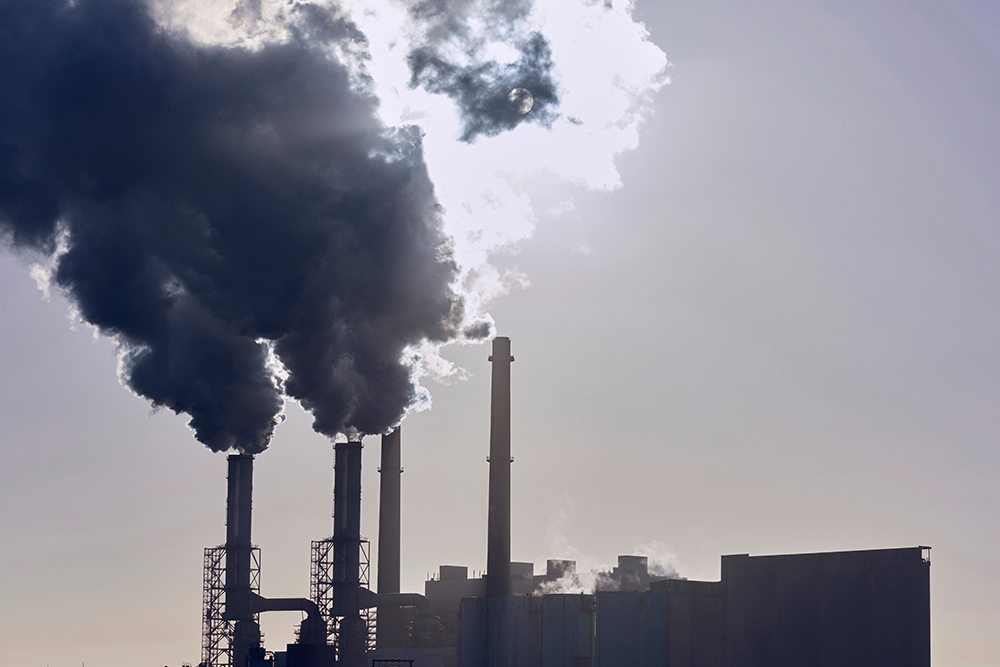
UPDATE: If one is liked by all, he hurts no one. Is the foundation 2° arbitrary?
Nallinger: No. But we are moderators. And they have to remain capable of dialogue. That includes environmental groups and scientists, unions and industry, associations and the democratic parties. We have to make sure that the doors don’t close. The worst thing would be if the willingness to talk between the players were to break down.
But we are not arbitrary, we are not giving up our positions. We drive the companies. We define positions and initiate processes that sometimes mean painful changes in the respective companies. If we were too radical, we would lose our role of moderation.
UPDATE: How does the foundation find out what the companies are actually doing?
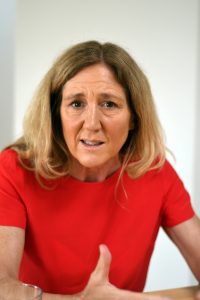
Nallinger: That is indeed not so simple. We now have 31 companies on board. Our job over the next few years is to work with the individual companies to develop their path to climate neutrality and to support them along the way. And always adapted to the respective situation on site or to the needs of the different sectors. To do this, we need openness and transparency towards us.
But we are not controllers. We want to work together to develop the toolbox that companies need for the path to climate neutrality.
UPDATE: Known again – how do you prevent the 2° Foundation from becoming a cover for greenwashing, i.e. climate-neutral cover?
Nallinger: In fact, we are very unsuitable for greenwashing, because it is not in itself an achievement to be accepted into the foundation as a sponsoring company.
UPDATE: It works after all. We are here and report on our own commitment. And so far, no one has been on site in Blomberg to see what we are really doing. But in the media it said: Phoenix Contact is committed to the Foundation 2°.

Heise: That will always be with us, of course. It will become more attractive for companies to join the 2° Foundation. In the beginning, companies that got involved with us still felt the pressure from the industry or the associations. That’s turning around completely, now everyone wants to outdo each other in the green sector. In our last report, we took stock of where our companies stand in terms of climate protection. But also: Where are the obstacles, what is still lacking, and what support do they need along the way?
Nallinger: Every transformation needs partners. And when it comes to climate protection, industry associations are not the first port of call, but rather an organization like ours that credibly represents its goals. We stand exclusively and only for climate protection, for nothing else. It makes no sense to join us publicly and then do nothing else – that would primarily reflect on the companies themselves.
UPDATE: You talk about a community of funding companies. How does this community work?
Nallinger: Firstly, actually through meetings here on site, which take place regularly at managing director and owner level. Then in projects such as “Weg in die <2°-Wirtschaft,” which we launched four years ago together with futurologists. The question was how and how quickly the economy will have to change in a 2° world and how companies can prepare for this. We set the framework for the topics of buildings, mobility and industry: one year’s time, cross-sector ideas. The result was eight concrete projects. Aldi, Telekom and EnBW, for example, came together and turned parking spaces that are empty at night in front of supermarkets into electric charging stations, supplied with green electricity and organized with an app developed by Telekom. A new business model.
Something like this has signal character. The task is so big that we have to tackle it together.
Another project was just published in the spring, together with AGORA Energiewende and the management consultancy Roland Berger and 17 companies from the energy-intensive industry. There were industries as diverse as copper, steel, chemicals and utilities. We identified twelve policy instruments that companies need for the transformation to climate neutrality. The document has attracted a lot of attention, both in the Bundestag and in Brussels.
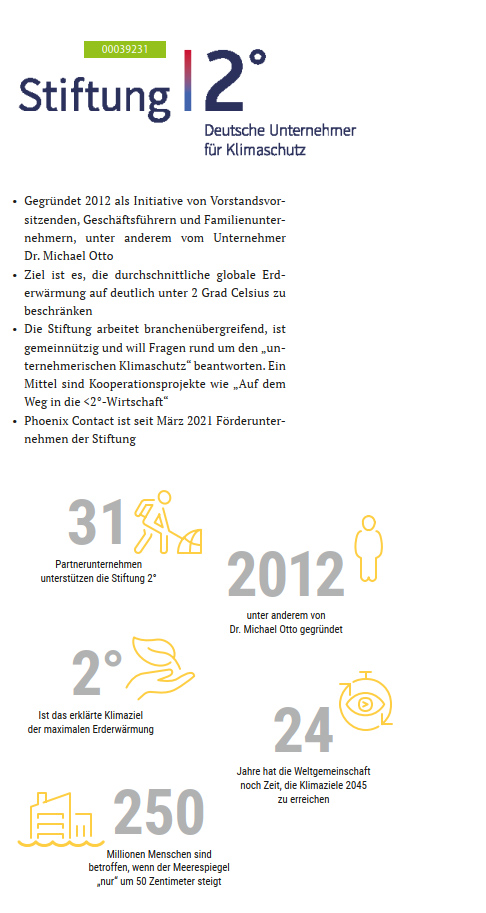
UPDATE: Does participation in this high-level industrial community also create competitive advantages? Here heavyweights come together on unusual terrain, there the exchange is promoted yes.
Nallinger: That can happen, of course. But that’s perfectly okay, and it doesn’t get in the way of what we’re trying to do, which is to act together to protect the climate. We have to think in a completely new way. I hear it from industry: This is the next industrial revolution. It needs new alliances.
Heise: Competitive advantages for climate protection, that’s what we’re aiming for. And everything that is created here in a joint effort will be published. We are not an elitist business club, but of course we welcome new value chains, new alliances, new cooperations. Climate protection as a business model – that is one of our goals. If money can be made from climate protection, then so be it!
UPDATE:What role does Phoenix Contact play in this, what input can our company provide?
Nallinger: What we need is the most concrete insight possible into climate protection on site. Where is the shoe pinching, which processes need special attention, what is already being done? How does Phoenix Contact want to become climate neutral and what does it need on this path? Can we help with scientific support or make obstacles visible so that the right political course can be set?
We can make a substantial contribution to achieving the Paris climate targets.
CEO Frank Stührenberg on the commitment to the 2° Foundation
UPDATE: On which topic is the Foundation 2° currently particularly engaged?
Nallinger: The amendment to the Renewable Energy Sources Act makes it more expensive for companies to consume the electricity they produce themselves than to buy it from outside. So if a large company decides today to produce green electricity itself, it is de facto penalized for this effort. This is how fossil fuels are massively promoted. That has to stop. Immediately.
UPDATE: Who is faster – politics or industry?
Nallinger: Clearly the industry. These companies are on the move internationally, watching the changing markets very closely. That doesn’t just apply to the German perspective. All markets are moving, sometimes the USA is ahead in terms of climate protection, sometimes China and sometimes Europe. National perspectives are playing less and less of a role.
UPDATE: Who brakes this development?
Nallinger: Many business and industry associations. The ZVEI is an exceptional association in a positive sense. And also still some representatives of the large government parties.
Heise: That is also one of our tasks. When the new climate protection targets were announced, there were immediately sharp dissenting voices from the industry associations. So we asked our companies to comment. They objected and spoke out clearly in favor of the agreed climate targets. But they also named what it would take for us to achieve these goals. There is not just one voice in business.
UPDATE: How does this misperception come about from politicians and industry associations who believe that business does not want climate protection? Is this the Berlin ivory tower?
Nallinger: You can see right now that climate protection is simply not suitable for the election campaign. Those responsible should actually be saying: People, the change in the economy is necessary and it has its price. Instead, they keep announcing new goals without saying what the path to achieving them will look like.
We have to take a more long-term view; we’re talking about billions of euros in investments that will have to be made before the end of this decade. For this, companies need planning security today, for which the next federal government must create a reliable and secure framework. And we are persistently pursuing this, together with our funding companies. So also with Phoenix Contact. (aj/lo)

stiftung2grad.de
Empowering the All Electric Society
Zeitenwende – Interview mit Roland Bent
